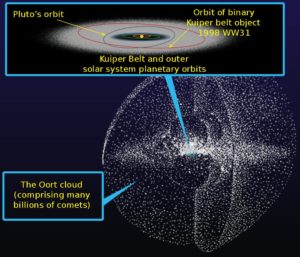 R.I.P., Stephen Hawking. You will be missed.
R.I.P., Stephen Hawking. You will be missed.![]()
In the preceding ditty, I’ve shown you that there is just as much evidence for a creator as for any alternative. I’ve left out a ton of stuff, too; don’t think that I even began to exhaust the details here. I didn’t.
At the risk of being accused of “appealing to authority” (heh — I told you, I’ve been involved in countless online debates), I would refer you to the links that I’ve provided throughout. You should especially read the articles that detail the reason why the Multiverse is becoming accepted science.
The only logical alternative, if this is the only cosmos, is that there must be a Creator.
And now it’s time for everyone to be honest (while still remaining friends; nothing but love for you).
 Justice: “Thou hast been weighed
Justice: “Thou hast been weighed
in the scales and found wanting.”
(Mankind: “can we get a do-over?”)![]()
Here’s the honesty; shall we hit the nail on the head? Those who reject the supernatural inevitably — the operative term here is, “inevitably” — do so because they don’t want religious people nattering at them about lifestyle choices.
(Can I get an, “amen,” brothers and sisters? In one debate many years ago, a fellow put it this way. “I can accept that there might be a God. What I object to is a God interfering with my dietary and sexual habits.”)
Science has not removed the need for faith. (A very fine distinction.) You believe that science will someday have all the answers. It does not have them now. It certainly has a good overall track record, but at the end of the day, if you insist that there’s no God, you are doing so by faith.
For many decades, science was (to use a phrase popular some years ago) “on a roll.” But I have also shown you here that, as we learn more, God ain’t quite as dead as was so famously proclaimed in the 1960’s.

Sorry, Richard. We can still be friends, though.
![]()
In previous sections, I’ve referred to those who actually study this stuff, as opposed to those who merely argue about it. It has been my great privilege to discuss much of what you’ve read here with some very smart folks — either online, or in a few cases, via private email.
Many have no real objection to the existence of God. (Most of them are agnostic, which is a fancy label for, “we just don’t know.”) They actually enjoy discussing possibilities and the nature of a Creator who might have brought this universe into being.
I specifically addressed the “large rock” problem earlier because it sums up many of their objections: if God is all powerful, could He make a rock so large that He couldn’t lift it? (And I also pointed out that the Trinity, the idea that God is both plural and singular, more than addresses that particular objection).
Another common objection is, if there’s a loving God, why is there so much evil in the world? We’ve addressed that as well. Who created God? I showed you that the only correct, logical, and yes, scientific answer is, no one, because He is outside of time.

The DNA Dance®. Tastes like chikkin.
![]()
By the way: you will note that I have stayed away from large number odds in this e-tome. You know, “the odds of a protein being assembled from base elements by natural forces is 1 in 10 to the zillion-ty zillionth!” I have done so for some good reasons.
First, it’s not easy to quantify these things. I’ll admit that in a heartbeat. Those who do calculate odds for stuff like this, at the end of the day, are often spit balling. There’s just so much that we don’t know. Simply put, I regard these “huge odds” numbers with as much skepticism as you probably do.
But second, in those cases where we do know enough to calculate meaningful odds, I’ve grown weary of trying to explain them to skeptics. I can assure you (at the peril of approaching another “appeal to authority” here) (heh) that these Big Numbers do impress people who understand them. But most people don’t.
Folks, there’s a reason why stores sell things for “$59.99” instead of $60. Even though you look at that item and say, “okay, it’s sixty bucks,” you’re more likely to buy it when the price tag says “$59.99.”
It’s even worse when you get into really, really big numbers. Most people just aren’t wired to grasp this intuitively.
 “If it was one cent more, I wouldn’t buy it!”
“If it was one cent more, I wouldn’t buy it!”![]()
For example, in an argument, I might say, “the odds are 1 in 10^6” (that’s one in ten to the sixth, or one in a million), then add, “but if you include the Blue Force interaction, the odds worsen to 1 in 10^12.” (I made that one up; don’t Google it.) But in fact, it’s six orders of magnitude less likely.
If I tell you that the odds have increased from 1 in 10^6 to 1 in 10^7, that doesn’t look like much, but it’s ten times less likely. It’s like I’ve asked you to push 50 pounds up a slope, then secretly increase it to 500 lbs.
At any rate … I’m just being honest, and I apologize if I’ve made you angry. Do me a favor: go ask a math professor why lotteries don’t violate the laws of probability, and why it’s not a prodigy that I should have been born in the Poole family with brown hair.
(Hint: in most of these cases, there’s intelligence — a will, if you will — at work, influencing the result.)
(Hmm. I could also make an important point about that, but I shall refrain.) (Heh.)
So, we’re back where we started. Whether you’re personally impressed by “large numbers” or not, remember, the reason why the multiverse idea has become so popular is to provide an alternative to Intelligent Design. A Creator. An Almighty God.
Period. So, at the risk of repeating myself, I’ll close by repeating the thing I want you to ponder deeply and honestly: either there is a Creator, or our Cosmos really is just a product of chance, and is just one of zillions.
It’s your choice, but if Believers are correct, the wrong decision could have eternal consequences.
Choose wisely.
Nuff Zedd!
Soli Deo Gloria


